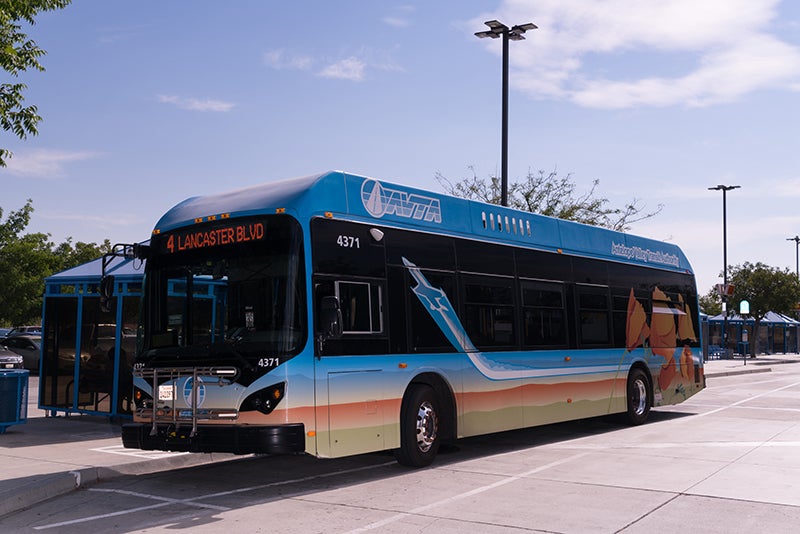Air Resources Board Hearing Brings California One Step Closer to Zero-Emissions Bus Fleets
The California Air Resources Board just held a public hearing in Sacramento to consider its proposed Innovative Clean Transit regulation.
Today’s the day to clear the air.
The California Air Resources Board (ARB) held its first of two official hearings on its Innovative Clean Transit Rule in Sacramento.
The rule would commit the state to entirely zero-emissions electric buses by 2040 — creating a huge opportunity to clean up our air and create jobs, cut pollution, and fight climate change at the same time.
At the hearing, many speakers demanded that the Air Resources Board take advantage of that opportunity.
“In the San Joaquin Air Basin, we’ve suffered more than 100 unhealthy ozone days [this year],” Rikki Weber, Litigation Assistant in Earthjustice’s California Regional Office, pointed out. “By passing the Clean Transit Rule we can give all Californians a better opportunity for healthy living.”
My @Earthjustice colleague @RikkiWeber masterfully advocating for zero-emissions buses @AirResources Board.#RightToZero pic.twitter.com/6dMOlpCGN5
— Adriano L. Martinez (@LASmogGuy) September 28, 2018
Today California is already experiencing the climate crisis and struggling with the poorest air quality in the nation. From Northern California communities blanketed by smoke and soot pollution from extreme wildfires, to the LA region choked by smog and traffic, to the aforementioned San Joaquin Valley, California is out of compliance with even basic clean air quality standards. Filthy air causes asthma attacks, lung and heart disease, and other health problems, and especially harms low-income communities and communities of color.
This opportunity to convert more than 11,000 clunky, diesel-and-gas-burning buses in California to zero pollution could quite literally clear the air.
Nate Pitkin / CC BY-SA 4.0
The first zero-emissions electric bus built in Lancaster, Antelope Valley, California, on July 13, 2017, near a BYD factory where thousands of workers build such buses.
“Buses are the electric vehicles of the people,” testified Jimmy O’Dea with the Union of Concerned Scientists (who spoke on a Right to Zero campaign panel discussion alongside ARB member John Gioa, in July).
#RightToZero supporters were out in force at today’s hearing, proudly wearing stickers saying “I ♥ Zero Emissions” and “Future Is Electric.”
Board members heard powerful testimony from public health experts like Will Barrett from the American Lung Association of California and Bill Magavern of the Coalition for Clean Air. An electrician from IBEW got choked up when talking about his wife’s struggle with asthma.
62 public comments @AirResources! People care about zero-emission buses! pic.twitter.com/bm9nLAIrz1
— Jimmy O’Dea (@jimmyodea) September 28, 2018
Manufacturers also made a strong show of support for the Innovative Clean Transit regulation! Electric bus makers Proterra, BYD and Motiv Power Systems shared comments about how state mandates have allowed their industry to grow and create hundreds of well-paying engineering, manufacturing, and business jobs across the state. Labor organizations like IBEW, CWA, SMART, Jobs to Move America and the BlueGreen Alliance concurred, with blue collar workers speaking up for the good, green jobs that can support working families and build the California Dream.
Unfortunately, natural gas industry representatives were also at the ARB meeting expressing concerns about the rule, but their comments were pretty muted as they saw the overwhelming support for moving to a zero emission bus future.
The truth is buses that combust methane and diesel continue to pollute. By contrast, zero-emissions electric and hydrogen fuel cell buses are the very definition of innovative clean transit — they’re the only buses without tailpipes and pollution. And because we’re on a path to 100% clean energy in California, the benefits of electric buses will just get better and better.
Brightline Defense’s Eddie Ahn spoke about the environmental justice benefits of a zero-emissions bus mandate, while the Sierra Club’s Carlo de la Cruz, Ray Pringle and Kathryn Phillips, and others reminded the Board that they must protect vulnerable communities who are just trying to breathe.
The takeaway from the Air Resources Board hearing on the Innovative Clean Transit Rule is clear. Transit agencies support it. Environmental groups support it. Health groups support it. Workers who make buses and install charging infrastructure support it. It’s good for California and as Air Resources Board Chair Mary Nichols concluded, “It’s time for zero.”
The California Regional Office fights for the rights of all to a healthy environment regardless of where in the state they live; we fight to protect the magnificent natural spaces and wildlife found in California; and we fight to transition California to a zero-emissions future where cars, trucks, buildings, and power plants run on clean energy, not fossil fuels.
Zoe Woodcraft
Public Affairs and Communications Officer, Earthjustice
zwoodcraft@earthjustice.org
